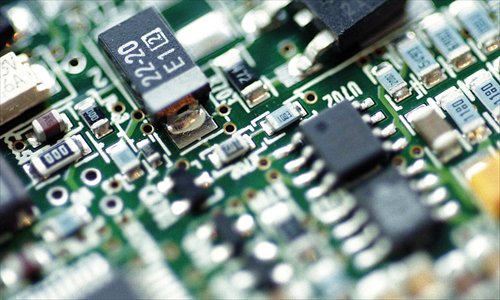Unisplendour shares rise on Intel news

Photo: IC

Shares of technology firm Unisplendour Corp surged by 10 percent to reach the highest permissible daily trading limit set in the A-share market Thursday, following media speculation that US semiconductor chip manufacturer Intel Corp is planning to buy a stake in Unisplendour's associated company.
Unnamed sources familiar with the deal were quoted by domestic news portal thepaper.cn Wednesday as saying that Intel would acquire a 20 percent stake in Tsinghua Unigroup for 9 billion yuan ($1.5 billion). The deal is expected to be released on Friday, according to the report.
Unisplendour, a Shenzhen-listed information technology unit of Tsinghua Holdings, closed its stock at 33.61 yuan per share Thursday, up 10.02 percent. Tsinghua Unigroup is also owned by Tsinghua Holdings, a fully State-owned company funded by Tsinghua University.
Both Tsinghua Unigroup and Intel did not reply to e-mail inquiries about the deal from the Global Times by press time.
Analysts believe that Intel expects the deal to help further its presence in China, the world's largest smartphone market, and reverse its laggard performance in the global mobile chipset market.
Intel, the leading PC chipset maker, has been lagging far behind its US peer Qualcomm Inc mainly due to its late entry into the global mobile baseband industry, Fu Liang, a Beijing-based independent telecom analyst, told the Global Times Thursday.
Qualcomm maintained its crown in the global cellular baseband market with an unmatched 66 percent revenue share in the first quarter of the year, which Strategy Analytics attributed to the wide-range adoption of its 4G LTE product portfolio particularly in China in a report released in June.
In 2013, over 60 percent of the TD-LTE terminal chipsets bought by China Mobile, the country's largest telecom carrier by subscribers, were reportedly from Qualcomm.
"It seems to be a wise move for Intel to bet on Tsinghua Unigroup, which will likely become the preferred chipset supplier for mobile devices sold in China, as local governments are encouraging R&D and application of homegrown information technology products and services due to information security concerns," said Fu.
Xu Xiaotian, head of China Semiconductor Industry Association, was quoted by news portal stcn.com Thursday as saying that a national fund for the integrated circuit sector would be set up to invest in major industries such as chipset manufacturing, totaling 120 billion yuan in the first phase.
Tsinghua Unigroup, a subsidiary of State-owned Tsinghua Holdings Co, has been proactively carving out its territories for its mobile chipset operation through acquisitions and mergers in recent years.
In July, the company completed its acquisition of RDA Microelectronics for $910 million after its takeover of Spreadtrum Communications Inc for $1.7 billion in December 2013.
Under the leadership of Tsinghua Unigroup, Spreadtrum overtook Intel by revenue market share worldwide for the first time, ranking third with 5 percent in the first quarter, while Taiwan-headquartered MediaTek Inc held on to second position with 15 percent, according to Strategy Analytics.
Zhang Yi, CEO of Shenzhen-based iiMedia Research, told the Global Times Thursday that it seems to be a good time for Intel to speed up its expansion into China, as its major competitor Qualcomm is being investigated by China for antitrust actions.
China's National Development and Reform Commission said in mid-September that it would soon reveal the penalties for Qualcomm, which reportedly may be issued a fine of 7.2 billion yuan.
Zhang noted that the Tsinghua Unigroup deal would smoothly pass review by authorities, because the stake held by Intel is not big enough and the government expects to bring in foreign advanced technologies to enhance the domestic semiconductor industry in order to reduce the reliance on Qualcomm.
"If the possible transaction can be finished smoothly, Tsinghua Unigroup would not only get funds to further develop its semiconductor business but also tap Intel's rich patent resources in the chipset industry," said Fu.
Upon the completion of the stake takeover, Intel would grant Tsinghua Unigroup its X86 Architecture license to develop chipsets for smartphone processors, said news portal thepaper.cn.
But Wang Yanhui, head of Shanghai-based Mobile China Alliances, told the Global Times Thursday that the X86 can hardly be compared technologically with the ARM processor used by Qualcomm, which means neither Tsinghua Unigroup nor Intel can shake Qualcomm's leading position in the near future.